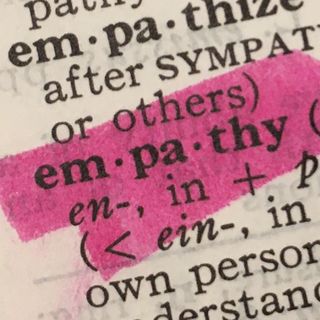Empathy
How to Avoid Empathy Burnout
Healthy empathy is empathy with an action plan.
Posted November 28, 2019 Reviewed by Kaja Perina

So much in life comes with training.
Nobody hands us car keys at age 5 and says, “Drive yourself to school, kid!” or shoves us into a classroom with a bunch of theorems on the blackboard and snarls, “Don’t come out till you understand calculus!”
You’d think we’d have a little more guidance in something as complex as managing our emotions.
Instead, we’re pushed out into the world without direction: “There’s your life. Don’t screw it up!”
As I explain in Unf*ckology: A Field Guide to Living with Guts and Confidence, this makes our emotions needlessly overwhelming.
This, in turn, leads to the sort of distressing situation one of my advice column readers was dealing with: empathy overload—empathy turned toxic and harmful, both to her and the people she cares about.
Now, empathy is defined in different ways by different researchers. Neuroscientists Olga Klimecki and Tania Singer explain empathy as our observing or even just imagining what another person is feeling and having it trigger the same sort of feeling in us.
Accordingly, this reader who wrote to me had some people in her life who were suffering. She felt empathy for them—as most of us do, automatically, when we see or hear about another person who's in pain or having a terrible time at something.
However, this woman didn’t just feel empathy; she got overwhelmed by it, to the point where it turned noxious on her, making her pull back from people she cared about when they needed her the most. As she explained it, it made her a bad daughter to her seriously ill mom and a bad friend to friends in need.
But she wasn’t a bad person. She was just unschooled in the nuances of empathy and the control we can take over it, so it’s helpful instead of harmful.
Again, our initial bolt of empathy is automatic. But once we experience it, Klimecki and Singer explain that we can funnel our empathy one of two ways: into unhealthy empathic distress or healthy empathic concern.
I explained in my advice column:
Empathic distress is a me-focused response—empathy that turns into emotional quicksand when we just keep “feeling with” a person (feeling and feeling and feeling) without doing anything to try to change their situation. In time, we get overwhelmed by the distress we’re experiencing at their distress. This often leads to what Klimecki and Singer call “withdrawal behavior”: our trying to escape our uncomfortable emotions by ducking out and leaving the other person alone with their suffering.
Empathic concern, on the other hand, is an other-focused response. It starts with our experiencing that initial bolt of “feeling with” a person who’s suffering, but then we shift into “feeling for”—as in “What can I do for you?” Empathic concern is basically empathy with an action plan, motivating us to try to make things better for another person.
The important takeaway for you is that you don’t have to let your feelings run the show, dragging you boohooing along behind them. You can instead control your feelings by shifting from me-driven empathy, empathic distress, to mom-centered empathic concern. In practice, this simply takes redirecting your focus from how sad you are to how helpful you can be—emotionally and practically. Think Warrior Nurse instead of Drama Queen.
And really, that’s “Warrior” Nurse, because the items on your superhero to-do list will be stuff like “Refill my mom's cup of ice chips, brush her hair, and fluff up her pillows.”
In other words, empathy with an action plan doesn’t take an empathic genius. It mostly just takes showing up.
As I learned when my late friend Cathy Seipp was struggling with lung cancer, one of the kindest, most welcome things you can do for someone who’s seriously ill is to give them some boringly normal things to focus on. You do this by watching TV with them, giving them a rundown of the latest gossip, and, perhaps, giving them an opportunity to gloat... that you’ve lost... at latest count... $26 million to them in gin rummy.
Disclosure: “As an Amazon Associate I earn from qualifying purchases.”
References
Alkon, Amy. "Unf*ckology: A Field Guide to Living with Guts and Confidence." St. Martin’s Griffin, 2018.
Klimecki, Olga, and Singer, Tania. "Empathic distress fatigue rather than compassion fatigue? Integrating findings from empathy research in psychology and social neuroscience." Pathological Altruism (2012): 368-383.




